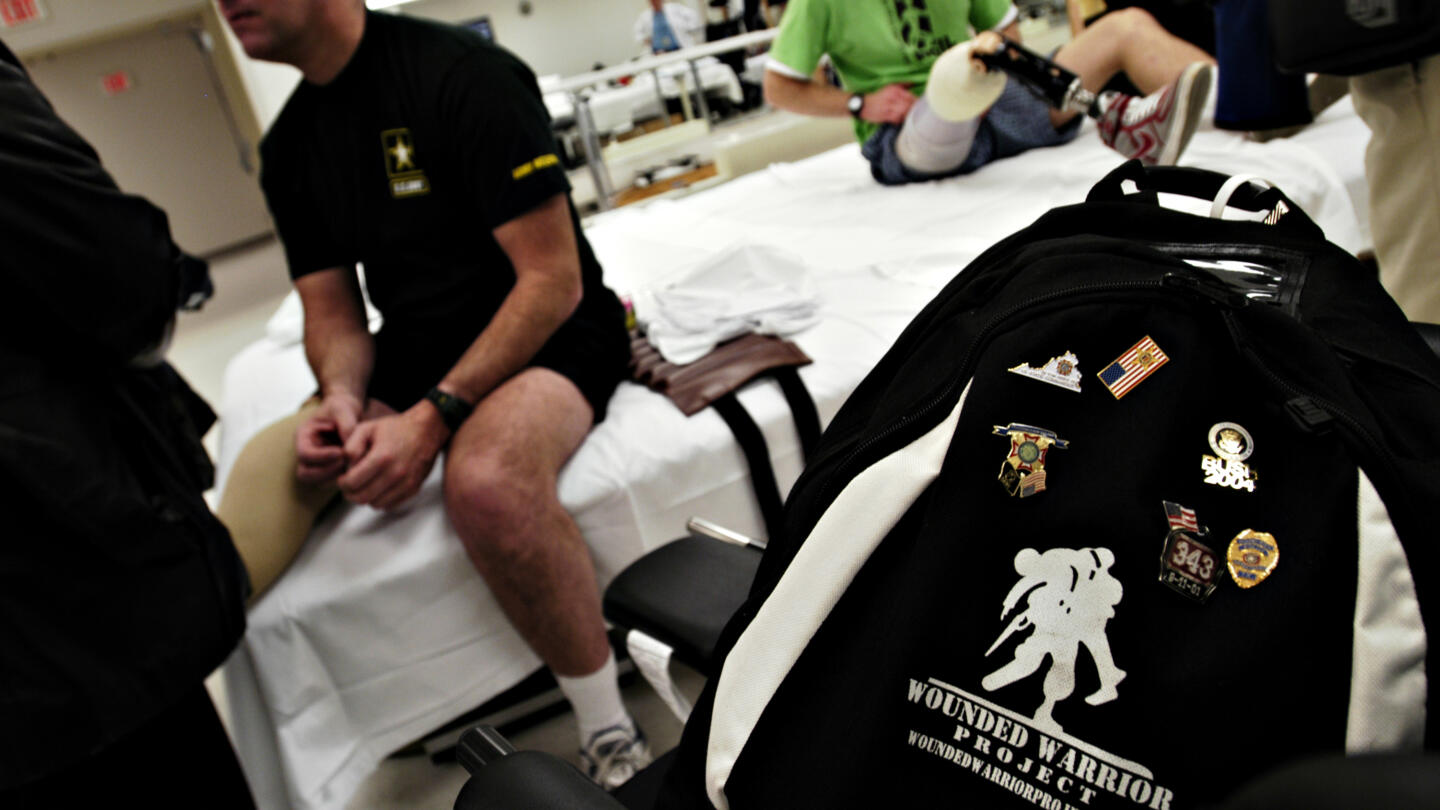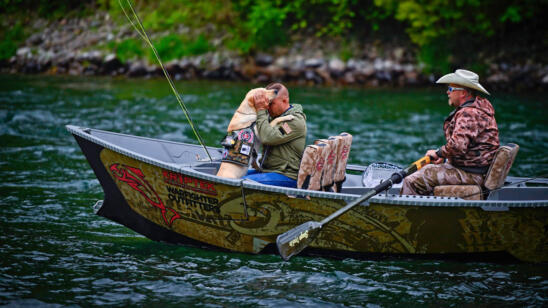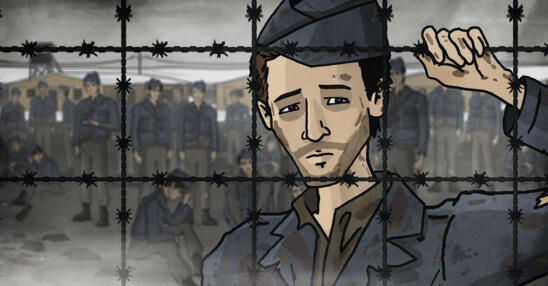The following content is brought to you by our partner, the Wounded Warrior Project.
From knowing how to listen to inspiring hope to recognizing when to stay firm in your convictions, lessons learned in the military are easily transferable to civilian life. We asked six combat veterans, all active injured veterans who volunteer their time to spread awareness about the Wounded Warrior Project, to offer not only nuggets they learned about leadership while serving, but also what they’ve gleaned post-retirement, as they’ve become coaches, social workers, project managers, founders of nonprofit groups and peer counselors. Here are a dozen pieces of inspiring advice.
Lesson 1: “A leader is a servant.”
Returning home with PTSD, traumatic brain injury and other ailments after serving in the U.S. Air Force from 1991 to 2012, Tim McDonough says he was “a bitter young man. I was belligerent. I was nasty. I was probably one of the meanest people on two legs.” But taking part in an Air Force Wounded Warrior adaptive sports camp changed everything. After a coach finally got him to try swimming, he practically had to be dragged out of the pool that was closing for the day. “It literally felt like a switch flipped in the back of my head,” says the New York native who now lives in Colorado Springs. “What else have you been missing, stupid? What else have you not been doing?”. The next sport he tried: archery. And now, several Warrior Games medals later, he’s attempting to make the U.S. Olympic archery team.
McDonough, 45, also an assistant coach for the Air Force Wounded Warrior Program (AFW2) archery team, says the military taught him that leaders are also servants. “If you can’t serve the people who are working for you and help them to move forward, motivate them and keep correcting bad habits, what kind of leader are you?” he says.
The retired technical sergeant points to a Purple Heart recipient involved with AFW2 who came in with a busted back, cracked hip and a slew of other injuries. “The first time I met him at a camp, he looked at me and said, ‘Well, how the hell am I supposed to shoot a bow? I’m broke this. I’m broke that,’ ” McDonough says. “And I looked at him and said, ‘I’ve been through 13 surgeries at this point, I went through the entire program and now here I am coaching you. Don’t tell me what you can’t do; show me what you can do and we’ll build from there.’ I don’t care if you’re missing limbs. I’ll teach you to shoot with your teeth, with your feet, with your hands. It doesn’t matter to me. If you want to put an arrow on paper, I will teach you how to do it.”
Lesson 2: “You have to be motivated and find your passion.”
McDonough, who also co-founded the nonprofit service dog program Shepherds for Lost Sheep, says he was drawn to archery partly because of his brain injury that causes his frontal lobe to be in constant overdrive. “My brain is always going,” he says. “The only time I get one ordered thought after another is when I shoot that recurve. If you want to be good at archery, you have to follow the steps, concentrate and focus. And that’s not just an archery skill, that’s a life skill—and what really got me to turn my life around and got me off the couch.” The father and stepfather of eight kids, ages 10 to 26, also coaches Junior Olympics archery and volunteers at a woodworking program for at-risk kids, another passion. “If you don’t believe in what you’re doing, then how can you inspire the men and women you’re leading? That’s something that holds true whether you’re doing archery or leading people into battle.”
Lesson 3: “You have to remain firm.”
Yomari Cruz’s family was shocked when they learned she was joining the Army. To tell the truth, the Orlando, Fla. native, who grew up a self-described girlie-girl (“I never even played a sport—I was an ‘indoor’ kid”), only agreed to enlist to support her husband—the newlyweds had planned to join the military together. In the end, she passed the ASVAB aptitude test, he didn’t and a divorce ensued, but, she says, there was no backing out. “It was really scary, but everything happens for a reason and God had a plan,” she says. “I went off to the military and—with the good and the bad—it was the best thing that ever happened to me.”
Cruz, 33, who served from 2010 to 2013 in an aviation unit, and was deployed to Jalalabad, Afghanistan, now works as a subcontract administrator at Lockheed Martin working on the F-35 fighter jet account. “Coming out of the military, it was really hard to adjust back into society,” she says. “I wanted an opportunity to give back and support my brothers and sisters even though I wasn’t an active soldier anymore. Working at Lockheed Martin gives me a sense of pride to know that we offer products that help soldiers with their everyday missions.”
But working in two male-dominated fields—the military and aerospace and defense—is not without its challenges. “Not only am I a female, but I’m Hispanic,” Cruz says. “But I grew a thick skin in the military. You learn very early on that you have to remain very firm and confident in your decisions and that you always have to prove yourself—and you have to prove other people wrong.”
Lesson 4: “You do not know every answer.”
A severe spinal cord injury sustained in 2005 during his deployment in Iraq should keep Dozer Reed from a lot of physical activities. But the Louisiana-based retired Marine and National Guardsman, 44, just doesn’t accept that. “I play softball. Not supposed to. I do adaptive triathlons. Not supposed to,” he says. “I can either sit at home, be absolutely miserable and complain about my life—trust me I’ve got plenty of stuff I can complain about—or I can do things that make me happy. Sitting on the couch and complaining? It doesn’t do any good.”
Reed, now a peer mentor with the Wounded Warrior Project, says one thing his road to recovery taught him is that there’s “way too much knowledge out there for you to know everything. But you need to learn, 1., how to reference and, 2., how to follow up. … Every situation is different and each individual is exactly that—an individual. What applies to one does not, and rarely ever, applies to another.”
Lesson 5: “Relish the moment.”
“Be thankful for what you’ve got,” Reed says. “When you look at that ‘the glass is half full or half empty’ concept, to me, it’s neither. It’s not half full or half empty. You’ve got to be thankful there’s something in the glass. Look at things from a positive perspective.”
That concept holds true, he adds, in leading by example. Reed, whose children are 2, 14 and 18, coached his son’s Little League team up until this season, and says winning is not always what’s most important. “How about being happy you’re on the field? Because there are kids out there who don’t even have that opportunity,” he says. “How can you as a coach, or as a player, leave a positive footprint? Do you want to be known as the player who was always yelling and talking back to the coach, getting frustrated and throwing his bat? Or do you want to be the player who always rooted for his teammates, the one never saying anything negative or cussing at the umpire? Which of these players do you want to be known as?”
Lesson 6: “You have to be able to listen.”
Leaders, Reed adds, must learn to actively listen. “William Taft once said, ‘Don’t write so that you can be understood. Write so that you can’t be misunderstood.’ It’s the same concept. When you’re leading, whether it’s in a group setting or one-on-one, you need to practice active listening and make sure that you are being understood to a T.”
Lesson 7: “Even just one person can make a difference.”
After serving in the U.S. Army from 1998 to 2004 (medically retired in 2006), including a tour in Baghdad, Iraq in 2003 at the beginning of Operation Iraqi Freedom, Angie Peacock says her transition to civilian life was rough. “I was way over-medicated by the VA, and I had developed an addiction to opiates—it took me 10 years to get off all the drugs that had compounded,” she says. But the Missourian returned to college in 2011, and is currently working to complete her master’s degree in social work with an emphasis on mental health at the Brown School at Washington University in St. Louis. When she first went back to school, at St. Charles Community College in St. Louis, she noticed veteran-themed license plates in the parking lot and started asking how she could form a student veterans group on campus.
After gathering signatures and getting approval from the student senate to start the Student Veteran Organization, Peacock, 39, says she was still unsure if the group would succeed. “Then we threw a pizza party to see if anyone was interested and 50 veterans showed up along with some staff members,” she recalls. “All this support was already there; it just hadn’t been tapped into yet. It really taught me that you have the power to make change—even just one person can make a difference.”
Within a year, the group had 80 members “and a whole new community blossomed,” she says. “We were playing dodge ball and going out for pizza and the college gave us space for a student-veteran lounge. We’re still friends six years later and the campus group is still going with new veterans taking over.”
Lesson 8: Make a power list.”
Encouraged by the Wounded Warrior Project’s Physical Health and Wellness team to take part in a 10-week CrossFit program back in 2014, Peacock began making an active lifestyle a priority. “I did one 5K a month and CrossFit for about three years,” she says. Besides the sense of accomplishment and comradery during the tough workouts, seeing the incremental progress was inspiring. “I read somewhere that you should make a power list of five things to do every day,” she says, such as write an email, pay a bill or run an errand, along with two health-focused items—eat three well-balanced meals or get eight hours of sleep. “If you make a list of five things every day and then actually do them, within a year you will have completed more than 1,800 tasks. If you run one 5K a month and time yourself, you will find yourself going a little faster every month. If you just keep working at something small, you will see steady progress toward your well-being. That’s how I approach everything: I might not be healed and 100 percent healthy, but I’m 5 percent healthier than I was a month ago.”
Lesson 9: “Surround yourself with people who are smarter than you.”
Lisa Crutch had every intention of joining the military when she turned 21, but “fortunately, and unfortunately, four days after my 21st birthday, I had my first child,” she says. Being a new mom and wife changed her path, but fate intervened: One day when she was 30, she was visiting her in-laws when a recruiter, who had the wrong address, rang the doorbell. “I invited him in, we started talking and that was it. I guess I was destined to be in the U.S. Army.” Crutch, 51, a mother to four children, served from 1998 to 2006, including a deployment to Iraq. She says she considers herself a leader now, but that wasn’t always the case. “Even when I was a sergeant in charge, I never really looked at myself that way,” she says. “Maybe that’s why I’m always trying to put myself around people who are smarter than me so that I can learn from them.”
Crutch says she teaches this lesson to her children. “I always tell my youngest son, who’s getting ready to go off to college, when you find yourself amongst your peers, and you’re the smartest one in the circle, you need to find yourself another circle,” she says. “You never want to be the smartest person in the room because then there’s no growth.”
Lesson 10: “Praise people when they do great things.”
“It makes me feel good when I can tell somebody else that they are doing a great job,” Crutch, who, with her husband, Donald Crutch, founded the nonprofits Honor Guards of America and National Pink Tie Organization. “I love to make people feel like they’re worth something. Even if I am the sergeant on a mission and people have trusted me with their lives, I have also entrusted my life with them. I have to believe—and I want them to know—that they can do certain things. Just because I’m in the leader position doesn’t mean that I know more.”
Lesson 11: “You might be down but you’re not out.”
Dan Smee served in the U.S. Army from 1983–1986, shortly after graduating from high school. But, some 15 years later, and at 39 years old, 9/11 prompted him to re-enlist in the National Guard. “Like a lot of Americans, I felt like I needed to do something for my country,” says the Southern California native, who served in Iraq as a medic.
Now Smee works for the Department of Veterans Affairs as a grant and per diem social worker, coincidentally out of an office next door to the one he visited after returning from Iraq in 2005, seeking help during his transition back into civilian life. Smee says that VA social worker fumbled his treatment. “I don’t think she really understood what I was going through, and didn’t comprehend my struggles,” the 54-year-old says.
Smee eventually did get the help he needed, which included going back to the core values he learned in the military: “Honor, duty, loyalty and respect.” It was then that he also decided to pursue a career in social work, earning a bachelor’s degree from California Polytechnic State University and a master’s degree in social work from the University of Southern California. “I wanted to be that social worker who actually knows what the guy or gal coming back from Iraq or Afghanistan is going through and can give them the services they need,” he says.
He says one of the biggest leadership lessons he imparts to veterans is that being down doesn’t mean you’re out. “I’m a testament to where you can go,” he says. “I struggled too when I came back and things went off the rails. But I was able to recover, and I tell them that if they put the time and effort into it, they can too.”
Lesson 12: “Discipline is everything.”
Smee is a fan of the book “Discipline Equals Freedom,” by retired Navy SEAL Jocko Willink. “It’s really a simple concept: Wake up early, make your bed, accomplish the small things and you’re setting up the table for everything else,” says the social worker and retired combat veteran. “These are basic military principles that I continue to live, eat and breathe. I tell the guys, ‘I’m not in my military uniform now but I still conduct myself like I’m wearing that uniform.’ I have pride and integrity in what I do, what I say and how I conduct myself. … If you’re willing to learn and get help and you’re grateful and humble, people are going to help you. If you exude positive energy, it’s the law of attraction—it’s going to come back to you.”


